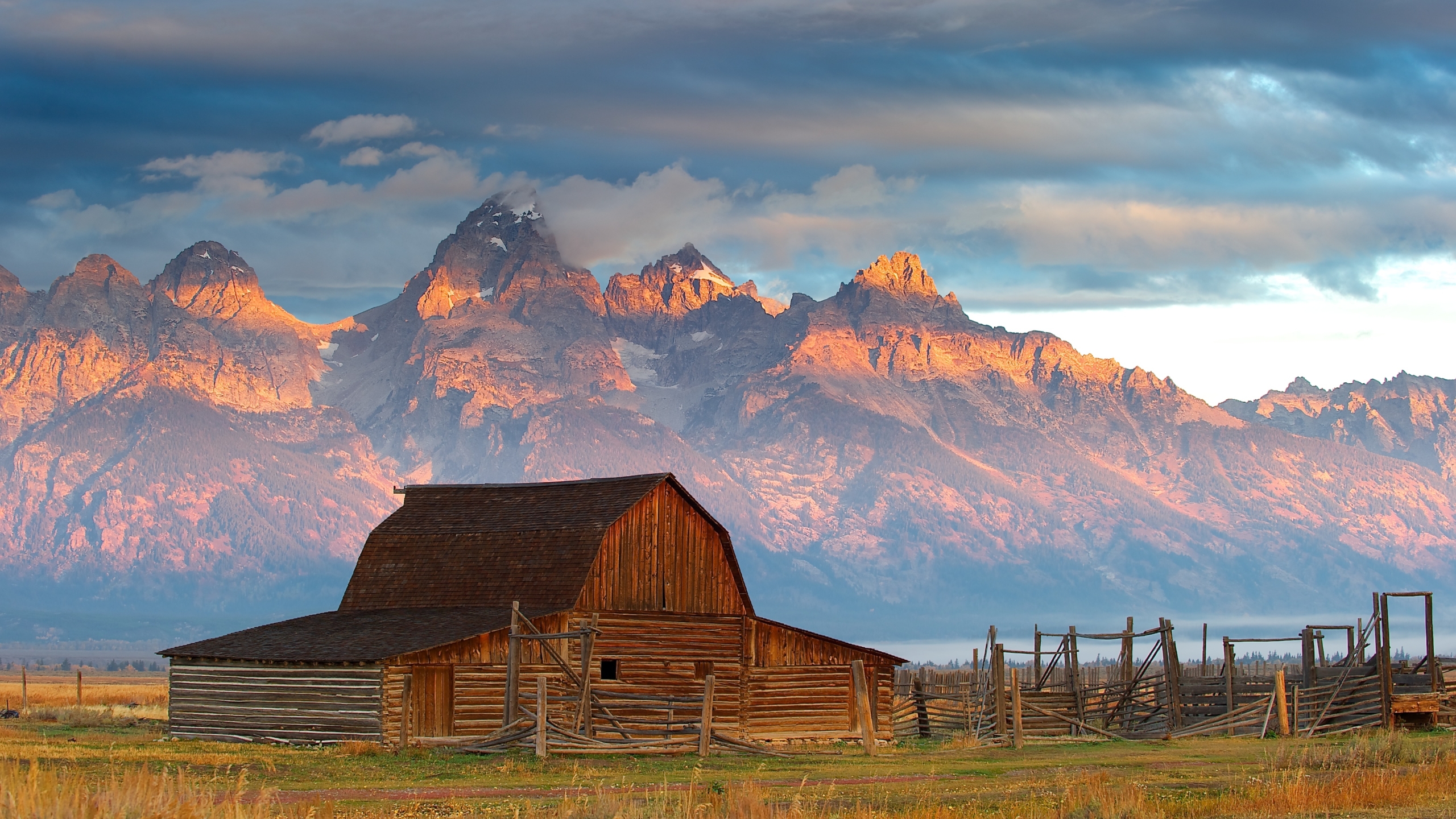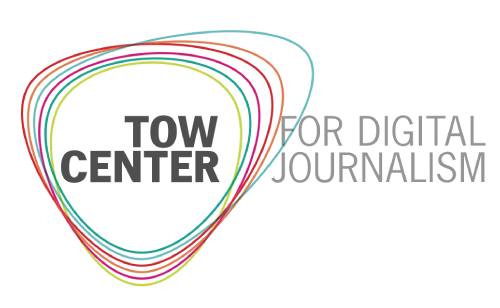In 2018, during the Republican primary for governor of Wyoming, Matt Copeland, chief executive and editor of the nonprofit newsroom WyoFile, got a series of phone calls. They were from candidate Foster Friess, and often, he wasn’t happy. Friess was a right-wing mega-donor turned political hopeful, endorsed by President Donald Trump. “He did not appreciate all of our coverage,” Copeland said. A story mentioning a Friess staffer’s unsavory past irked him, Copeland said, so Friess asked Copeland directly to pull the story. Copeland refused. “He responded by letting me know, ‘Well, Matt, if we can’t find a way to cooperate, I’ll need to find another way for Wyoming to learn the good news about its leaders,’” Copeland recalled. Friess went on to lose the primary. Around six months later saw the launch of Cowboy State Daily, a new media organization with an apparent Republican bent. Its executive editor was Jimmy Orr, a former White House spokesman and director of digital strategy for George W. Bush. Original funding came from Foster Friess.
Cowboy State Daily, a digital outlet and registered nonprofit, claims to be “Wyoming’s largest newspaper.” It nips at the heels of waning legacy outlets like the Casper Star-Tribune (circulation 12,000) and the Wyoming Tribune Eagle (circulation 14,000) as well as dominating nonprofits like Copeland’s WyoFile on social media (60,000 Facebook followers versus WyoFile’s 7,700) despite being founded ten years later. Like most US states, Wyoming has suffered a decline in local journalism in recent decades; this year the Casper Star-Tribune reduced its weekly print run to three days. The drop-off follows a national pattern that’s seen the US lose over 2,100 newsrooms since 2004, a trend that, Tow Center research has found, accelerated during the pandemic with at least a hundred more news organizations (local and national) closing.
America’s growing news deserts have become vulnerable to wealthy partisans setting up local news outlets to push their political agendas. This has raised concerns about one-sided, politically motivated narratives being strong-armed into local political discourse . “We recognize that so much news does exist in partisan echo chambers, and because of that there has been a rise in misinformation and disinformation. Our stance is that journalism should exist to serve the public and give them news and information that they need to make informed decisions,” Sharene Azimi, communications director at the Institute for Nonprofit News (INN), told me. (WyoFile is an INN member; Cowboy State Daily is not.) “We think that being dedicated to journalism, being free of partisan stances, being transparent about your financials, are what helps people be able to trust you,” Azimi added.

Cowboy State Daily launched in 2019. The nonprofit newsroom says its staff are “providing Wyoming with the news YOU need and none of the clickbait you don’t.” Jim Angell, a well-respected journalist in the state, was involved in the founding and became managing editor, and Leo Wolfson, who came on board as a political reporter, was known for his impartial coverage. But from the start the outlet’s political agenda seemed heavily weighted in one direction. Alongside executive editor and former Bush staffer Orr, the founding board included Annaliese Wiederspahn, the daughter of Republican senator Cynthia Lummis, and the columnist Bill Sniffin, who was a campaign communications consultant for Friess. Friess also insisted on running content from the Daily Caller, a conservative populist website launched by Tucker Carlson, for which he was a founding investor. (Friess died in 2021.) From one perspective, these strong conservative ties might be viewed as reflective of a deeply red state in which 82 percent of registered voters are Republican. From another, they provoke concerns about journalism ethics and the implications of wealthy political operatives exploiting the gaps left by the local news crisis.
In December 2022, Mike Yin, a Democratic member of the Wyoming House of Representatives, was supporting a bill sponsored by Republican Dan Zwonitzer seeking to raise the minimum age of marriage. Wyoming still had a law that made it legal for children under 16 to get married with parental permission, which lawmakers wanted to change. But when Yin saw Cowboy State Daily’s coverage, he was shocked. The article said the bill was seeking to lower the age of marriage. With Zwonitzer on a flight, unaware of what had happened, Yin messaged the newsroom. The article was quickly deleted. But Yin’s requests for a correction were ignored. “It was up for a significant amount of time where lots of people had emotional reactions on the FB [Facebook] post and as such has affected Dan’s reputation based on an incorrect reading of the bill,” Yin wrote to them, according to emails shared with me. “We all make mistakes, but it’s important to try and mitigate the damage of the mistake. I hope that CSD will issue a correction soon.” After eleven days without that correction, Yin posted a thread on Twitter documenting the error—criticizing what he saw as a lack of journalistic ethics. In response, according to text messages shared with me, an editor said: “I think our perspective was we never heard anything more from the public about it so we weren’t trying to draw any more attention to it.”
Removing material without explanation contravenes the Society of Professional Journalists’ (SPJ) ethical code around accountability and transparency. Melissa Cassutt, president of Wyoming’s branch of the SPJ, declined to comment on the specific incident, but told me that deleting articles without explanation “undercuts trust with the media.” For Yin, the experience was “a little mind-boggling,” he told me in June. He added that it fit a pattern of sensationalist, clickbait coverage from the newsroom. The decline of local media has “left that opening,” which has led to “Cowboy State Daily filling a void very quickly,” Yin told me. “Surprisingly quickly.”
Amid concerns of partisan agendas seeping into local news, the Tow Center looked at the outlet’s coverage of two hot-button culture war topics: the climate crisis and trans rights. Cowboy State Daily’s energy reporting has appeared to throw doubt on the reality of man-made climate change, which is the consensus among the global scientific community. Headlines have included:
- “Study Says Climate Change Fear-Mongering Severely Impacting Children’s Mental Health”
- “National Teachers Group Censors Climate Science That Doesn’t Conform to Disaster Agenda”
- “Woke Capitalism Takes Another Blow as Vanguard Withdraws from Climate Alliance”
- “Is Greta Thunberg Actually Smart or Is She Just a Propped-Up Celebrity Armed with a PR Machine?”
Tow Center analysis of Cowboy State Daily content found the five most commonly cited institutes/think tanks in energy stories all had links to climate denial. These were: the Heartland Institute (mentioned in fourteen articles), Manhattan Institute (eleven), American Petroleum Institute (ten), Institute for Energy Research (ten), and Competitive Enterprise Institute (seven). All five appear in nonprofit DeSmog’s Climate Disinformation Database, which tracks organizations that “delay and distract” on the need to reduce greenhouse gas pollution. (By comparison, WyoFile’s climate coverage in the same period did not mention think tanks linked to climate disinformation, or cited them critically.)
The Heartland Institute has received funding from Exxon Mobil and the Koch Foundation and has tried to undermine the science on man-made climate change. The Manhattan Institute, a free-market think tank, has received funding from Exxon Mobil and published research saying the costs of climate change are overblown. The American Petroleum Institute—which has received millions of dollars from Shell, Exxon Mobil, Chevron, and BP—has sought to promote “uncertainties in climate science.” “That is the primary goal of these institutions, to sow doubt,” Sam Bright, deputy editor at DeSmog, told me. “It’s like a conveyor belt, similar to what Jane Mayer in Dark Money calls the ‘Kochtopus’: that information beneficial to petro-institutions is published by think tanks, and the ideas perpetuated by these institutions are received fairly successfully by politicians and the media.” Citing such sources uncritically risks increasing the spread of climate misinformation, Bright said.
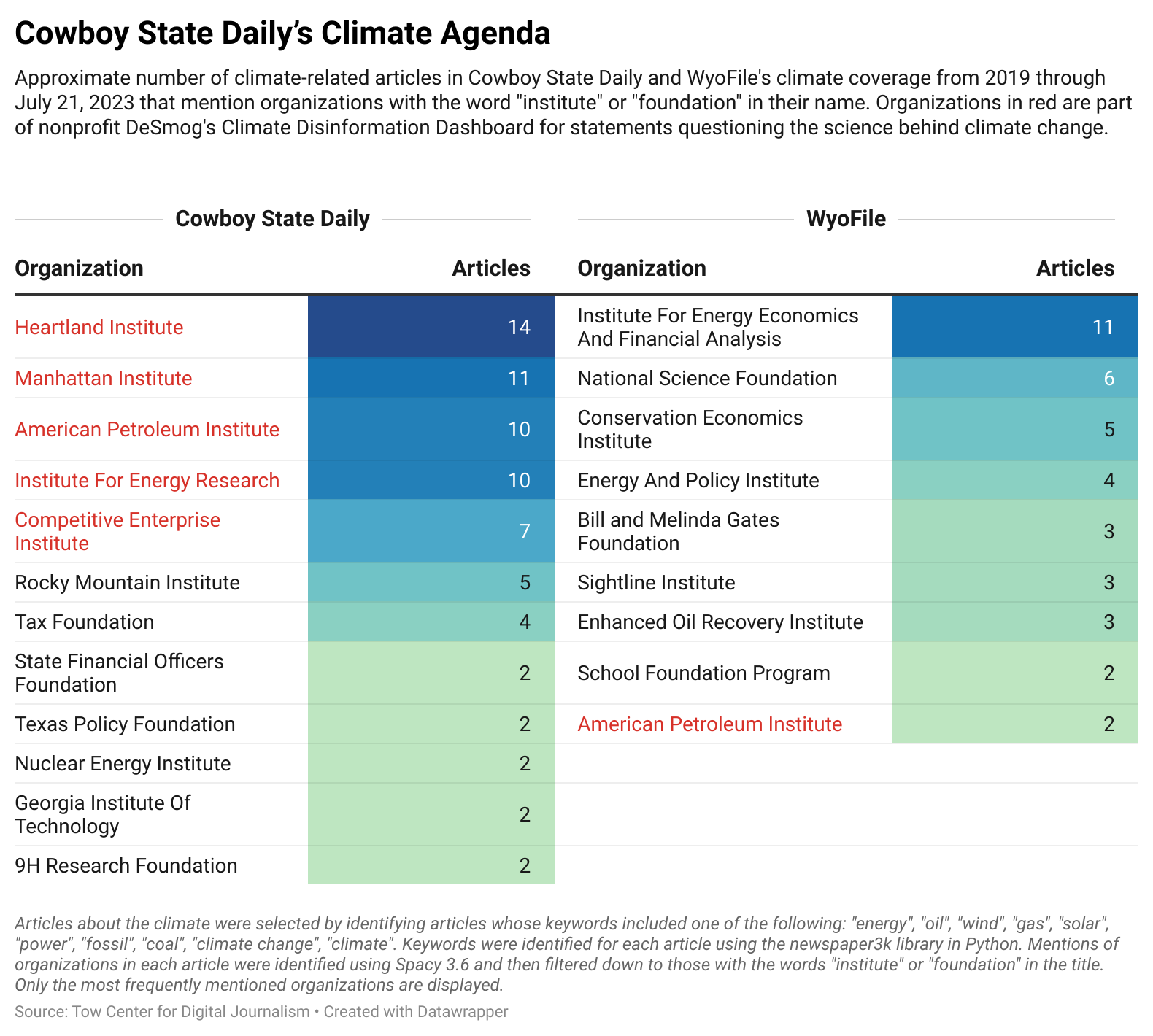
Perhaps the apparent pro-fossil-fuel leaning of the newsroom’s stories is not so surprising. Wyoming, the nation’s smallest state, with a population roughly the size of Baltimore, relies on the oil and gas industry. In 2022, mining accounted for 6 percent of all jobs, according to official statistics, as well as 10.6 percent of the state’s total payroll. But the outlet’s green-energy-skeptic stories have helped encourage a hostile environment for people trying to transition to a lower-carbon economy, Tennessee Watson, state desk editor at WyoFile, told me. “The anti-climate-change reporting feeds into a certain narrative” that makes it harder for political candidates pushing to decarbonize to gain traction, she said.
Then there is coverage of transgender communities. Cowboy State Daily has been criticized by LGBTQ rights organization Wyoming Equality for deadnaming and using phrases like “biological males/females” to refer to trans people. One Cowboy State Daily columnist wrote they “draw the line” when someone “born with male genitalia and a masculine endocrine system tries to impose himself in a women’s [sic] world.” Per Tow Center analysis, the outlet has published 129 articles mentioning the word “transgender” in 2023 so far, almost double the 68 found from 2022. That’s not necessarily significant given the national and statewide uptick in interest in trans rights this year. But our analysis also found numerous instances where Cowboy State Daily reporting on trans communities used tropes the Trans Journalists Association’s style guide says perpetuate “harmful cliches and stereotypes.” These included “groom” (seventeen articles), “detransition” (seven), and “biological male/female” (forty). By contrast, WyoFile appeared to have used “biological fe/male”—which goes against the style guide for “hyper-focus on trans bodies”—just twice, in critical contexts.
Earlier this year, Sara Burlingame, executive director of Wyoming Equality and a former Democratic member of the Wyoming House of Representative, contacted Cowboy State Daily. She wanted to discuss its coverage of Wyoming’s trans people. To Burlingame the writing has been alarming—“where they deadname trans people, where they out trans people and students…where they use phrases like ‘he is an intact male.’” This is not only “profoundly dehumanizing,” but relies on tropes for “talking about livestock,” she said. Burlingame is concerned this rhetoric might spill over into political violence. (In fact, in May 2022, a gender treatment and abortion clinic was torched with gasoline by an arsonist.) She requested a meeting with managing editor Greg Johnson and executive editor Orr to outline why this language is so dangerous. But Burlingame said in July that the meeting never happened.
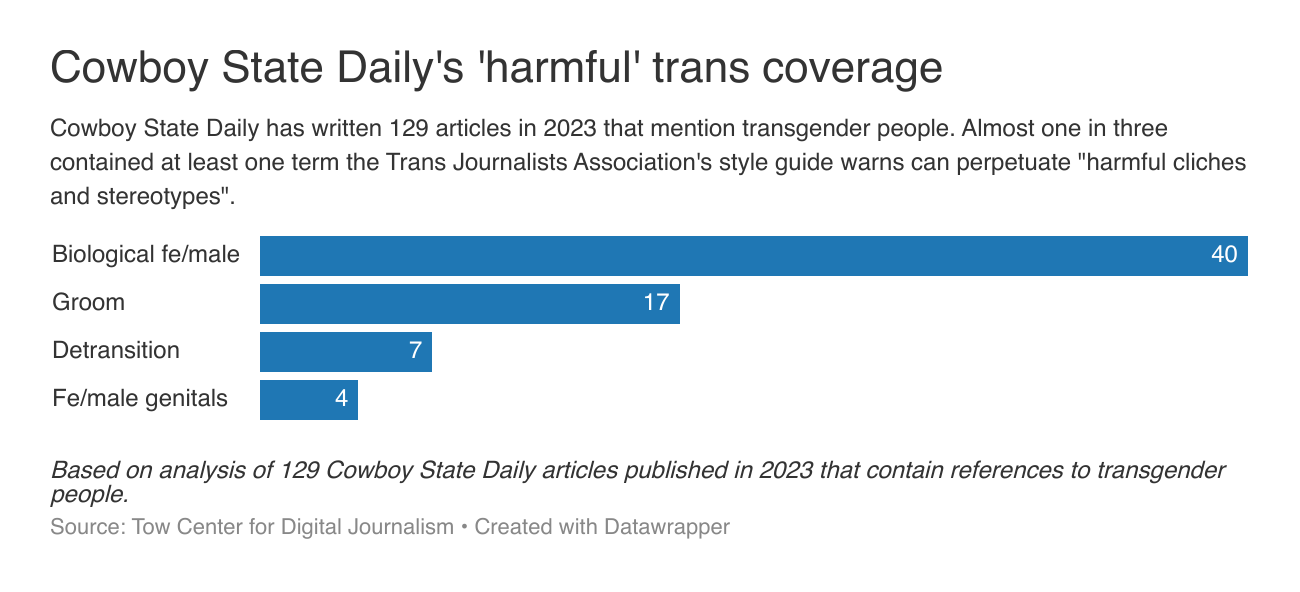
Trans rights have been weaponized by the right in recent years to become one of the nation’s most politically divisive culture war topics. There have been 566 anti-trans bills across the US in 2023, according to the Trans Legislation Tracker. The trend was even referenced by Trump at a recent North Carolina rally. “It’s amazing how strongly people feel about that. You see I’m talking about cutting taxes, people go like that [clapping unenthusiastically]—I talk about transgender, everybody goes crazy,” Trump said. “Who would have thought? Five years ago you didn’t know what the hell it was.” This spring, Wyoming’s state legislature passed a bill banning transgender women and girls from participating on interscholastic sports teams. Even Governor Mark Gordon expressed concern that the legislation was “overly draconian” and “discriminatory,” although he did not deploy his veto power.
In Wyoming, the heightened importance of trans issues and other culture war topics (banning books, curtailing abortion rights) in the legislature follows a change in the state’s political strand of Republicanism. “There was this real libertarian ethic”—a belief the state should keep out of most issues—“that is starting to disappear,” former Casper Star-Tribune reporter Nick Reynolds, now senior politics reporter at Newsweek, told me. This libertarianism is being replaced by a more state-interventionist conservatism, through which populist politicians are wielding governmental power to take on “wokeness” by outlawing books and banning abortion and gender affirmation surgery.
For Burlingame, of Wyoming Equality, the allure of attacking trans rights for Republicans is its ability to join outrage with action. Most GOP voters “don’t think that the government can do anything about” the majority of issues that matter to them, Burlingame said. But by attacking transgender people, gender ideology, and critical race theory, Republicans discovered a “sweet spot: if you hit on those, not only are people outraged, but they believe if they go to the polls and they vote for the right person, that person could do something about it.” (Still, whether this new breed of American conservatism will resonate with voters at large remains to be seen, as Florida governor and presidential hopeful Ron DeSantis’s sputtering campaign has shown.)
Cowboy State Daily was approached for specific comments on accusations of right-wing bias, transphobic reporting, anti-climate-science coverage, and violating the SPJ’s code of ethics. The editor responded with a broad statement by email: “Cowboy State Daily is incredibly proud of our success. While many news outlets have lost readers and advertisers, we are the state’s biggest publication—by far—because we respect our readers and don’t lecture down to them. We will continue to pursue fair and independent journalism, despite the complaints of a few critics whose activism has caused the public to lose faith in the journalism profession.”
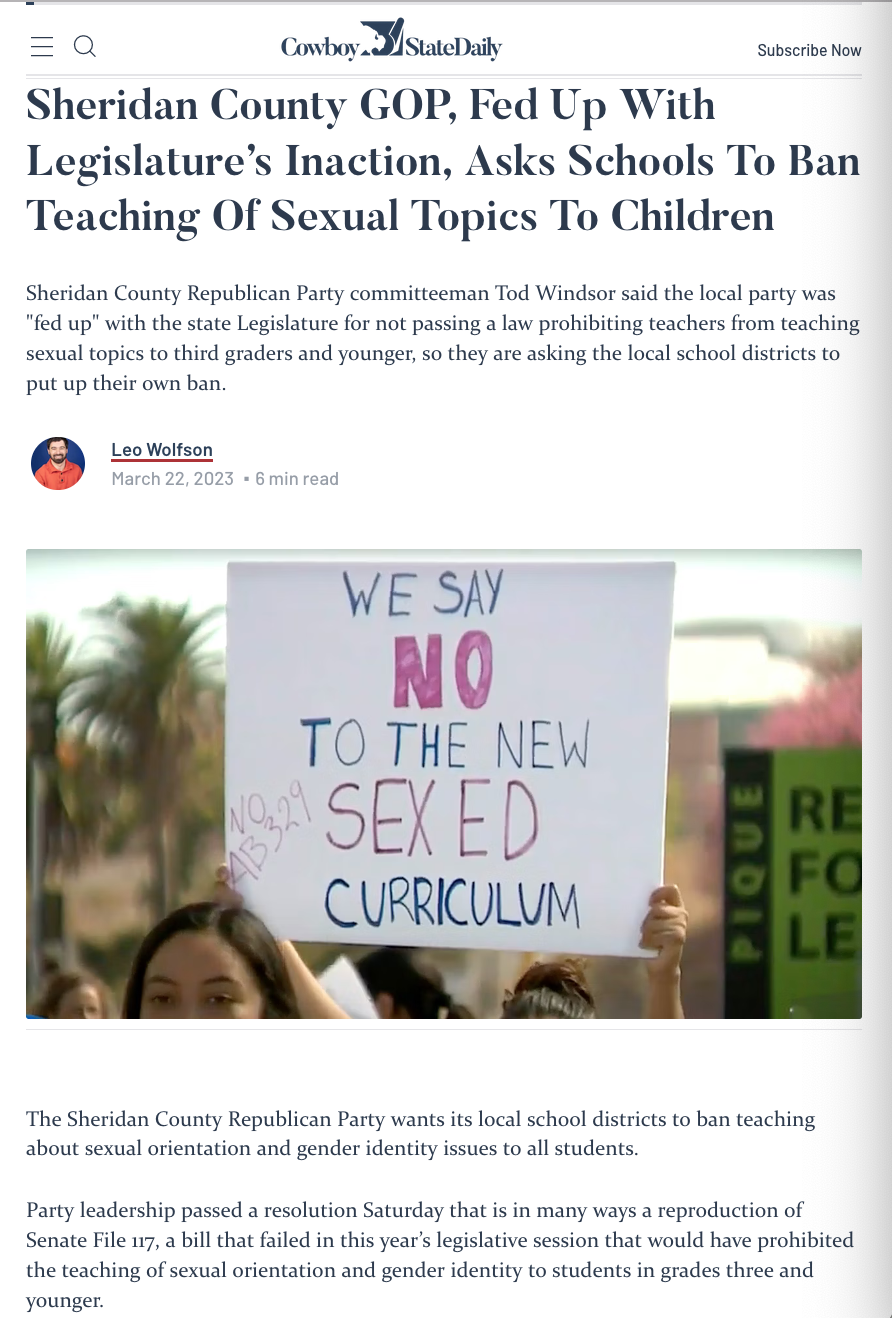
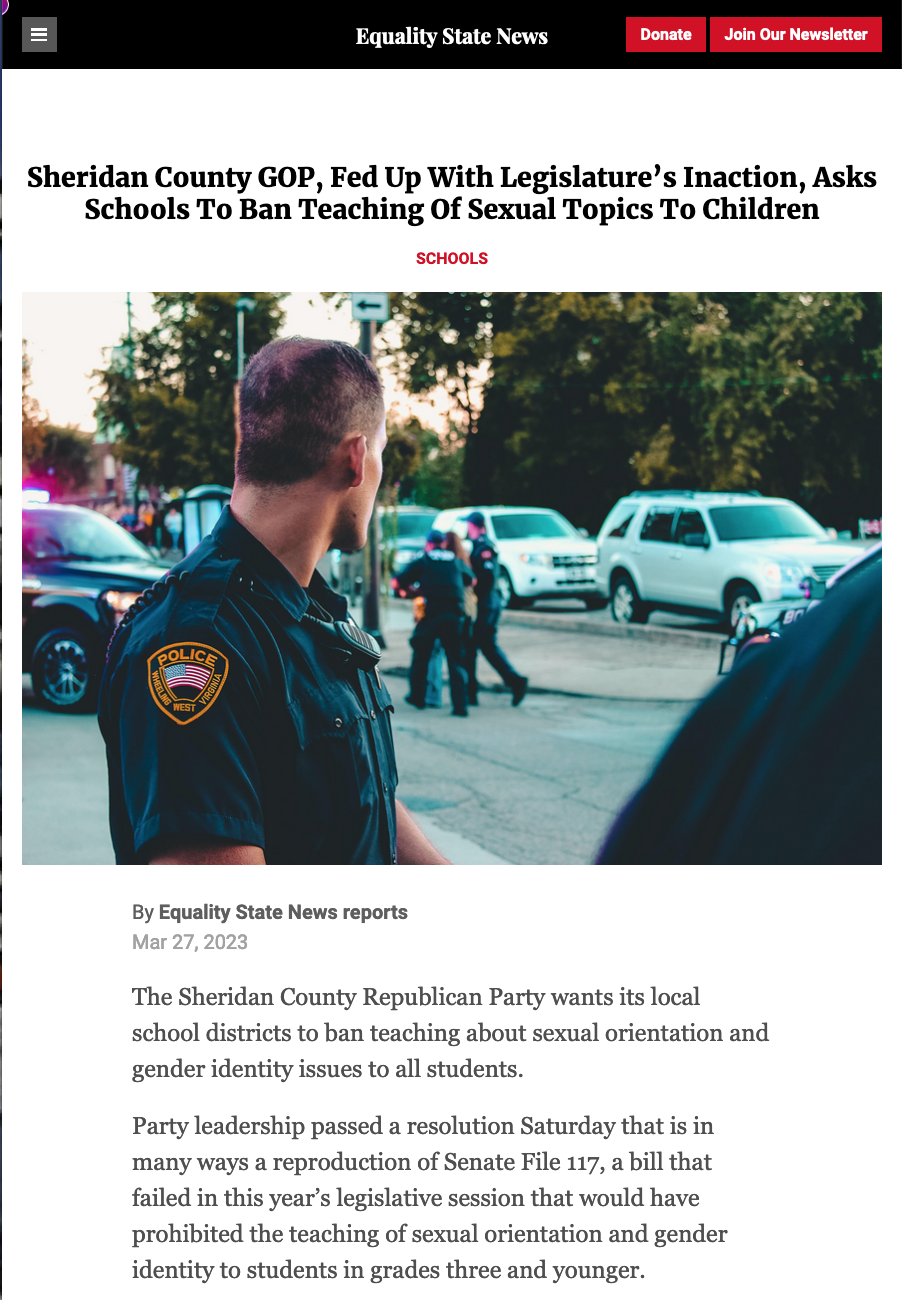
Some Cowboy State Daily articles are republished verbatim by sites in the Metric Media network, a nationwide collection of roughly twelve hundred news publications that the Tow Center has been investigating for years. Metric Media outlets—which portray themselves as providing community reporting but are used to platform right-wing politicians and forward conservative talking points and are deployed as tools for crisis management—received over $1.6 million in funding from oil and gas and shipping magnates in the last election cycle. Metric Media has seven news sites for Wyoming. Some, like Central Wyoming News or Wyoming Business Daily, cite and link to articles (“according to Cowboy State Daily”), while others republish entire Cowboy State Daily articles under their own bylines, as has happened with topics ranging from local economics to bans on teaching gender identity in schools (see images above). Cowboy State Daily articles often prompt stories on the same topic—like coverage of a Wyoming lawsuit over a school’s handling of a trans boy’s transition—in the right-wing Daily Caller, too. In this way, Cowboy State Daily helps feed a wider partisan local media matrix.
Where is all this heading? There are concerns declining standards of local journalism will have implications for the health of democracy. “You can see it time and time again around the globe, and certainly here in the US, that less savory information is going to flood in to fill that vacuum,” Copeland said, making it “difficult for folks to participate in civic life in a fully informed way.” When WyoFile was founded, in 2009, it arrived as an outlet dedicated to enterprise reporting that topped up the important daily news of Wyoming’s legacy papers. Back then, “we were maybe providing the protein to the carbs and dessert” of other media offerings, Copeland said. Today, “we’re the protein and the leafy greens and the whole grains—and increasingly the rest of the landscape is doing more of [just] the dessert.”
In this sense, Wyoming’s experience—declining local news, a vacuum of good information, a mega-rich partisan setting up a news outlet that has pushed anti-trans views and climate misinformation—is an alarm bell for the rest of America. If local news cannot find a route to sustainability, actors with cash and questionable motives are free to inject their talking points into the political bloodstream. It’s a warning for where we’re heading as news deserts take hold.



